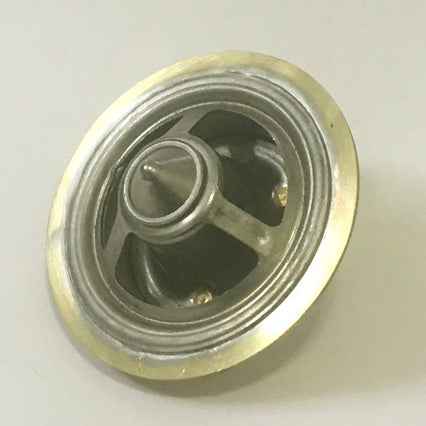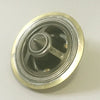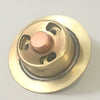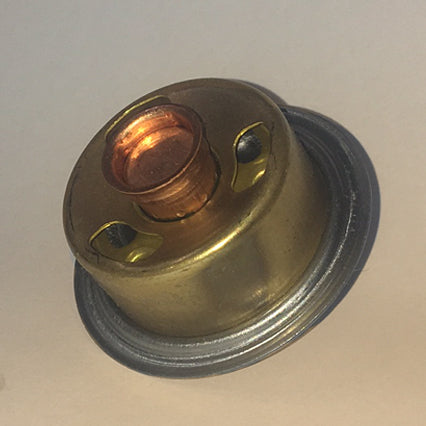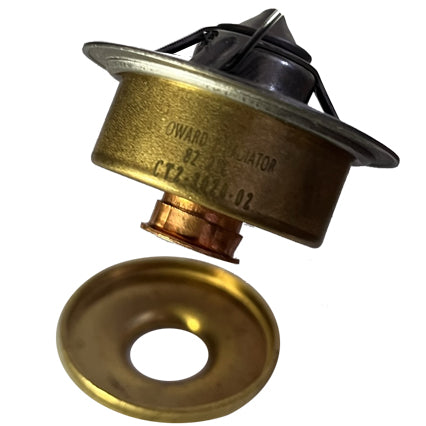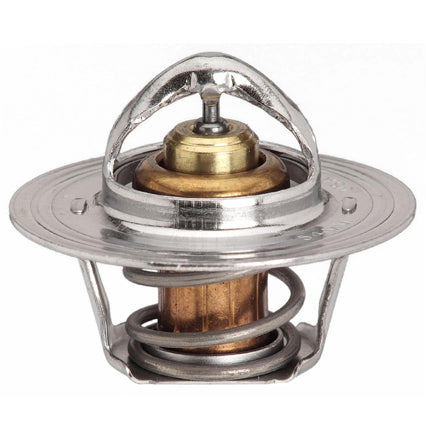Your cart is currently empty!
Robertshaw 370 series substitute hi flow balanced sleeve thermostat
$43.00
Robertshaw 370 series substitute hi flow balanced sleeve thermostat
$43.00
The difference between the Robertshaw 370 Series and the 330 Series is the flange diameter.
Fits Mopar, Some Ford, Lincoln, Mercury, AMC L6 Buick Nailhead and Y blocks
Why Robertshaw? Because we make a hi flow pump and its unique three port construction or "balanced sleeve" design equalizes the system pressures above and below the thermostat’s moving valve. Therefore the thermostat is pressure balanced and will respond to system temperatures only. No other thermostat does this.
Other Features of a Robert Shaw Thermostat:
1) Stress-free construction. Robertshaw makes the thermostat's strut assembly from stainless steel using a technique to permit two brads per strut. Other manufacturers forcefully attach the struts to the housing with intense, metal-weakening pressure on the struts, binding each strut in only one spot.
2) The Power Pill®. This is the heart of a Robertshaw thermostat. It detects minute changes in the temperature of the coolant, and quickly activates a precision-engineered stem or piston to open and close the thermostat valve.
3) One-piece bypass poppet. With other thermostats, the bypass valve stem is welded on. The weld tends to fail under stress. To eliminate this problem, Robertshaw manufactures the entire copper cup and bypass stem from a single piece of metal.
4) Short-stroke piston. In conventional thermostats, the piston must make a large stroke to open the thermostat far enough for adequate coolant flow. But the long stroke compromises durability. Robertshaw engineers achieved a shorter stroke with a uniquely-designed flange and poppet. This design increases the longevity of the thermostat, yet still allows adequate coolant circulation.
5) Contoured strut. Making the strut assembly from brass instead of steel provides another benefit: brass, being more malleable than steel, can be precisely formed to maximize coolant flow.
6) Uniform quality. Robertshaw builds all thermostats to OEM standards -- so your replacement thermostat is identical to those used in new Fords, Chryslers, and other cars. The Power Pill At the heart of a Robertshaw thermostat is the power pill. Its job: to detect minute changes in the temperature of the coolant, and to quickly activate a precision-engineered piston that opens and closes the thermostat valve. Compared to the thermal elements in some thermostats, Robertshaw's Power Pill® has major advantages:
1) Rapid response. The Power Pill's piston is activated by a temperature-sensitive mixture of metallic powder and wax. Some thermostats use an all-wax charge, which responds slowly to temperature changes. Other brands mix copper powder with the wax for faster response, but the copper quickly separates from the wax. Robertshaw developed a process to maintain suspension of the copper powder in the wax, so the fast response doesn't deteriorate and the thermostat will not "stick-open" to cause the engine to run cool.
2) Reliable performance. Most manufacturers use a one-piece rubber diaphragm to seal the charge and drive the piston. If the rubber part ruptures, the thermostat fails. Robertshaw uses two separate parts: a diaphragm to seal the wax, and a stem seat or plug that drives the piston. Rubber material for each part is formulated especially to meet each part's unique requirements. Wear or damage to the stem seat still allows the thermostat to operate satisfactorily.
3) Precise performance. Every Robertshaw Power Pill is calibrated to bring the thermostat's start-to-open temperature within strict tolerances.
| Make | Model | Year | Excluding |
|---|---|---|---|
| AMC | 1954-1966 | All | |
| Buick | 1953-1966 | All | exc. '53 Special and 300, 340 |
| Cadillac | 1942-1962 | All | |
| Chrysler | 1975-1978 | All | |
| Desoto | 1961-1957 | All | |
| Dodge | 1951-1959 | All | |
| Dodge | 1951-1978 | 8ycl | |
| Edsel | 1958-1960 | All | |
| Ford | 1952-1964 | 6cyl | exc. 144 170 200 |
| Ford | 1954-1961 | 8cyl | |
| Hudson | 1955-1957 | 6cyl | |
| Lincoln | 1958-1968 | All | |
| Mercury | 1952-1964 | 6cyl | exc. 144 170 200 |
| Mercury | 1962-1967 | 8cyl | |
| Mercury | 1961-1964 | 8cyl | |
| Nash | 1955-1957 | 6cyl | |
| Packard | 1957-1958 | All | |
| Plymouth | 1941-1959 | 6cyl | exc. 41-50 Specical DLX |
| Plymouth | 1955-1978 | 8cyl | |
| Studebaker | 1938-1960 | 8cyl |
